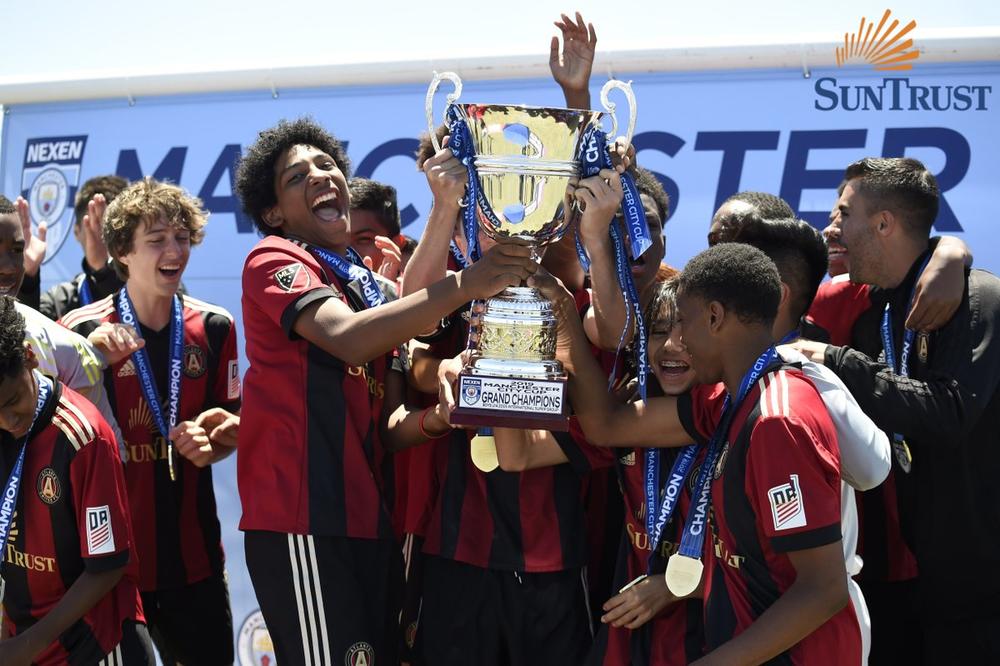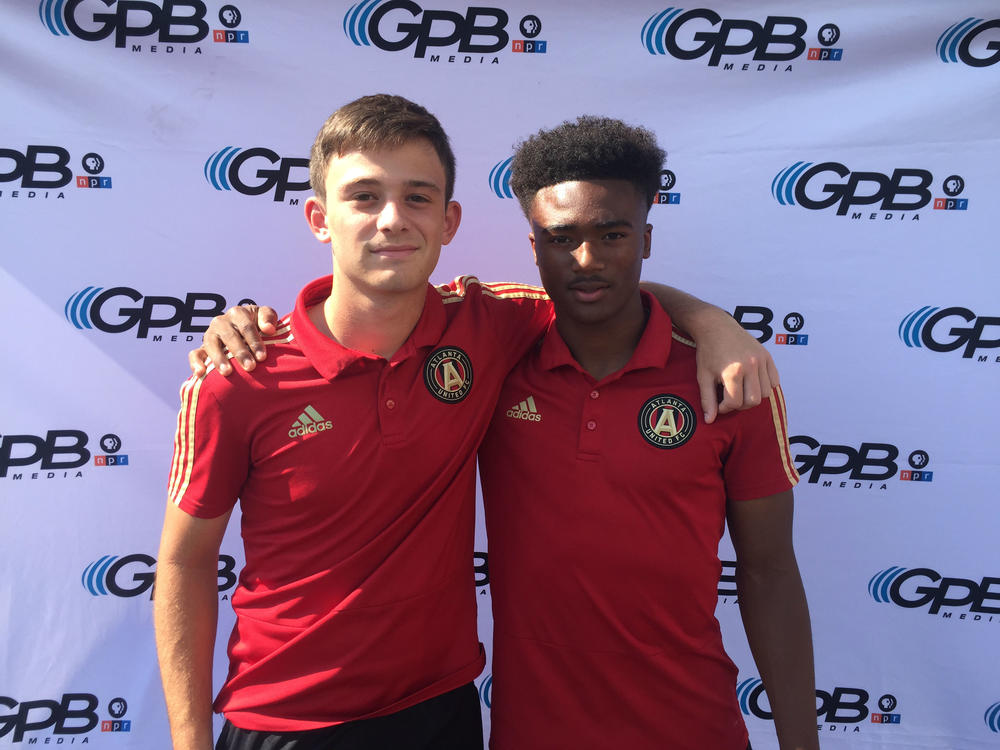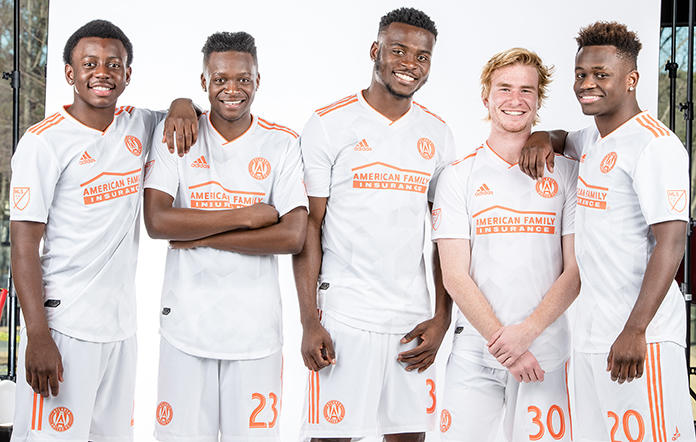Section Branding
Header Content
Atlanta United Academy Trains Next Generation Of Star Soccer Players
Primary Content
In 2018, Atlanta United defender George Bello became the sixth youngest player in Major League Soccer history to score a goal at age 16.
He’s a homegrown soccer player that trained at the Atlanta United Academy for several years before being signed in 2018.
The league requires each team to run programs like the Academy to train boys starting from age 11 to be the next generation of star players for the league.
Eight players on the Atlanta United roster graduated from the Academy. Other graduates have continued their careers playing at the college level.
GPB's Rickey Bevington explored Georgia’s growing soccer culture in a show broadcast live from an Atlanta United tailgate in the Gulch in downtown Atlanta May 29.
She talked to the founders of a new professional soccer team in Statesboro, Atlanta United superfans and organizers of an Atlanta nonprofit that does youth development through soccer.
She also sat down with two up-and-coming soccer players who train with the Atlanta United Academy: 17-year-old Brandon Clagette who plays right wing and 17-year-old Josh Francombe who plays center midfield and well as Academy director Tony Annan.
Rickey Bevington: What is Atlanta United Academy?
Tony Annan: It's an academy with 145 players, male, from ages 11 all the way up to 19. We have seven teams that compete in the highest level of soccer across the U.S. It's a fully funded program, so the players don't pay for anything, and the barriers of pay-to-play are not in the way.
We look for the very best players to play on our teams to try and produce professionals, number one, for the first team. And then obviously, the rest of all guys go to college and continue this education with scholarships to NCAA colleges.
Bevington: Are they all from Georgia?
Annan: 90% [[of them]]. We do bring kids from other states who are very talented. We have a homestay program where we place them with a family. They train full-time, so they leave their families usually around age 15. Most of them are 15 to 17. The guys we bring are from North Carolina, South Carolina, Alabama, Florida and Tennessee. We've got a couple of guys that have traveled in from there.
Bevington: So it's quite a commitment for these young people?
Annan: Absolutely. It's pretty much a way of life for them. To be honest, that's their number one, time spent with me and with all our teams. They spend more time with us than they do with anybody else. But they're very committed to what they're doing, and they all have a goal that they want to be professional soccer players, or at least get a good scholarship to college and try and go professional from that.
Bevington: Speaking of dedication, Josh, you just told me that you are doing high school completely online through Riverwood. Is that so you can devote the rest of your time to Atlanta United Academy?
Josh Francombe: I want to be able to spend as much time trying to improve myself as a player, and by going [to school] online, I can allow myself to do training during the day...and be able to miss more school for trips outside of the country or outside of the state.
Bevington: Do you travel a lot?
Francombe: We do. We took a trip to Mexico earlier this year. We go around the country. [We] go to San Diego every summer, and we went to Texas for two and a half weeks this year.
Bevington: That's incredible. Brandon, you are a student at Woodward Academy?
Brandon Clagette: Yes ma'am.
Bevington: What has been your experience playing with Atlanta United Academy?
Clagette: For me, it's really a balance of education and soccer. So I feel like it's really preparing me to go to college. I'm taking that route, so I have to get my studies done but also have time to train and better myself to get to the next level.
Bevington: So, Tony, why don't you talk about why Major League Soccer requires franchises like Atlanta United to train and develop younger players?
Annan: As a coaching staff as a whole, we're obviously trying to embrace the sport like they do in the rest of the world, but also produce youth players who can move into the roster.
They don't hit the salary cap, so from a business standpoint, having homegrown players is a very lucrative opportunity for the academies. It is a huge investment from owners into the academies [with] the size of the academies and the schedule that they compete in.
It's not cheap to run an academy, so it is a big investment. But on the return, you can get two or three guys who play for you, for their whole team, for their home city, also obviously saved money on the cap. That's sort of the objective of what we're trying to do.
Overall, it's an enhanced development at a very, very fast rate across the country because the investment is now going into those academies and obviously [is] starting to produce. There's a lot of young players now signed [to] professional contracts. Hopefully, it continues and we can produce more players which will benefit the national team and the pro game in this country.
Bevington: And any business will understand the need for talent development at all levels, but for soccer it's going to be at the younger level because people start playing in the pros at 18 or even younger.
Annan: George Bello is a prime example. He's signed a professional contract when he was 16 years old now, and he was put the first team last season at 16 years old.
Bevington: Unbelievable.
Annan: Those are the kind of guys we need to get through, and obviously they are great for the city. They are that great for the team and a great for business.
Bevington: Josh, what's a daily schedule like for you as an Atlanta United Academy player?
Francombe: Well, since I don't go to school, I'm often at home online. I have two training sessions sometimes on Mondays and Fridays where I'll train around 10 a.m. about an hour there, go home, continue to do some schoolwork and then come back to the training ground at around 5:45 p.m. We train for about two hours which includes gym work and on the field work as well.
Bevington: Unbelievable. The discipline of these 17-year-olds is very impressive. Brandon, do you have your sights on a particular college or particular team? You're 17, so you're probably thinking over the next couple of years for yourself?
Clagette: Yeah. Right now, the college recruiting process is really starting to pick up, getting exposure in GA Cup and Sarasota. We go to Florida to play in a couple of showcases. I'm starting to look at a lot of colleges and starting to see the academic piece and the athletic piece, trying to see my fit see where I'm going to go, see if it carries me to the next level to become a pro.
Bevington: For young soccer players growing up in Georgia, what's it like to be a soccer player in a state that's really a football state?
Francombe: The game has been a part of my life since I've been very young, and I have tried to embrace it as much as possible. As Atlanta United is sort of coming into the fold, thanks to people like Arthur Blank and all the people that made it possible, it's been fantastic for me to be able to have the experience under a professional academy.
Clagette: Over the years, I've seen it change so much from just playing club soccer and not having a professional team [and] not having a route to go pro through that. It just changed a lot, just playing with my friends indoors. Now, we have a direct route to get development at like the highest level possible right now.
Bevington: Some of your teammates are now playing like George Bello playing with Atlanta United. It must be very exciting for you to see your peers going to play in Major League Soccer.
Clagette: Yeah. You just get to see the like the talent that's around you. You're surrounded by people who want to get better every single day. It pushes you to really be the greatest you can be.
Francombe: Right. Being able to have that experience of playing with players who were at your level and sometimes even above your level really pushes you to be the best. You want to be able to work for them and push yourself to become as good as you possibly can just to make that next step and make that jump.
Bevington: Tony, for those of us who are interested in maybe attending Atlanta United Academy games, Do you have fans? Do you have a schedule? Do people go get tickets?
Annan: Yeah, so you don't have to pay. When we play at home, we play at the training grounds in Marietta, and they are pretty much open on game days to anybody who wants to come in and watch these teams play.
We've got a lot of supporters who are not just parents of the kids. People like to come and watch a lot of the matches and support our groups. There's a few of those guys come up as well to see new talent.
It's open to the public, so it's not hard. The schedules are online. You can pull up the game schedule and obviously you've got a 12 all the way through to the 19. There's plenty of games to watch.
This conversation has been edited for clarity and conciseness.




